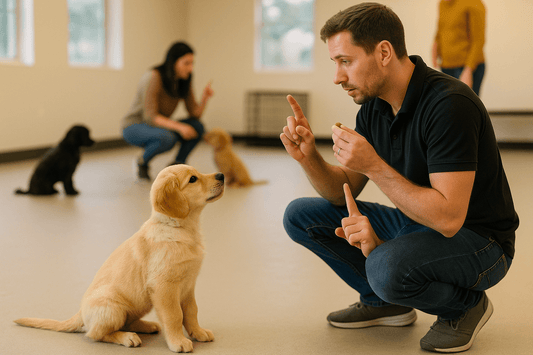Watch any puppy at a dog park, and you'll see pure joy in motion—tail wagging, bouncing, chasing, and wrestling with abandon. But play isn't just about having fun. For dogs, play is a fundamental need that impacts their physical health, mental well-being, and social development. Understanding why play matters can help you become a better pet parent and ensure your furry friend lives their happiest, healthiest life.
Physical Health Benefits
Exercise in Disguise Play is nature's perfect workout program for dogs. A good game of fetch provides cardiovascular exercise, while tug-of-war builds muscle strength. Interactive play helps maintain a healthy weight, improves coordination, and keeps joints flexible—especially important as dogs age.
Energy Management Regular play sessions help dogs burn excess energy in a positive way. A well-exercised dog is less likely to engage in destructive behaviors like chewing furniture or excessive barking. As the saying goes, "A tired dog is a good dog."
Mental Stimulation and Cognitive Development
Brain Training Play challenges your dog's mind just as much as their body. Puzzle toys, hide-and-seek games, and problem-solving activities keep their brains sharp and engaged. This mental stimulation is particularly crucial for intelligent breeds that need cognitive challenges to stay happy.
Stress Relief Just like humans, dogs experience stress and anxiety. Play releases endorphins—those feel-good chemicals that naturally reduce stress and promote relaxation. Regular play sessions can help anxious dogs build confidence and cope with daily stressors.
Social Skills and Bonding
Learning Proper Behavior When dogs play together, they learn important social cues and boundaries. Puppies discover bite inhibition, body language communication, and how to interact appropriately with other dogs. These skills are essential for well-socialized, confident adult dogs.
Strengthening Your Bond Interactive play between you and your dog builds trust and deepens your relationship. Whether it's a game of fetch or learning new tricks, these shared experiences create positive associations and strengthen the human-animal bond.
Age-Appropriate Play
Puppies (8 weeks - 6 months) Focus on gentle play that encourages learning. Soft toys, basic fetch, and short training sessions work best. Avoid high-impact activities until their joints are fully developed.
Adult Dogs (1-7 years) This is prime time for active play! Hiking, swimming, agility training, and interactive toys all provide excellent physical and mental stimulation.
Senior Dogs (7+ years) Gentle play remains important for maintaining mobility and mental sharpness. Consider puzzle feeders, short walks, and low-impact games that accommodate any joint issues.
Creating the Perfect Play Environment
The right toys and environment make all the difference. At Happy Tails, we understand that quality play starts with quality products. From interactive puzzle toys that challenge the mind to comfortable beds where your dog can rest after playtime, every element contributes to your pet's overall well-being.
Signs Your Dog Needs More Play
- Destructive behavior when left alone
- Excessive barking or whining
- Restlessness or pacing
- Weight gain
- Withdrawn or depressed behavior
The Bottom Line
Play isn't a luxury for dogs—it's a necessity. By incorporating regular, varied play into your dog's routine, you're investing in their physical health, mental well-being, and your relationship together. Remember, the best play sessions are safe, age-appropriate, and most importantly, fun for both of you.
What's your dog's favorite way to play? Share your playtime stories with us—we love hearing how Happy Tails families create joy together!








